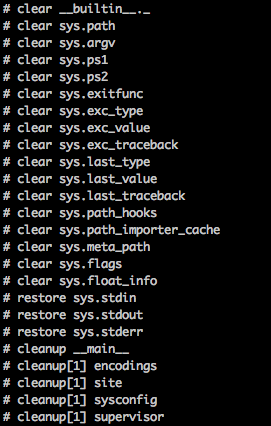man python 查看python的帮助文件
命令行参数:
-B Don't write .py[co] files on import.
See also PYTHONDONTWRITEBYTECODE.
当使用import的时候,不产生.pyc/.pyo文件
-c command
Specify the command to execute (see
next section). This terminates the
option list (following options are
passed as arguments to the command).
直接指定执行的命令
举例:python -c 'print "shen"'
-d Turn on parser debugging output (for
wizards only, depending on compila-
tion options).
-E Ignore environment variables like
PYTHONPATH and PYTHONHOME that mod-
ify the behavior of the interpreter.
-h , -? , --help
Prints the usage for the interpreter
executable and exits.
-i When a script is passed as first
argument or the -c option is used,
enter interactive mode after execut-
ing the script or the command. It
does not read the $PYTHONSTARTUP
file. This can be useful to inspect
global variables or a stack trace
when a script raises an exception.
执行完命令、py文件后进入交互模式
举例:
python -i -c "print 'shen'"
shen
>>>
-m module-name
Searches sys.path for the named mod-
ule and runs the corresponding .py
file as a script.
在sys.path里的路径里搜索某个模块,并运行相应的.py文件
将模块按照脚本执行,最常见的用法是:
python -m SimpleHTTPServer 8081
在打开浏览器的8081端口,可以用于局域网的简单文件下载服务
-O Turn on basic optimizations. This
changes the filename extension for
compiled (bytecode) files from .pyc
to .pyo. Given twice, causes doc-
strings to be discarded.
-OO Discard docstrings in addition to
the -O optimizations.
-R Turn on "hash randomization", so
that the hash() values of str, bytes
and datetime objects are "salted"
with an unpredictable pseudo-random
value. Although they remain con-
stant within an individual Python
process, they are not predictable
between repeated invocations of
Python.
This is intended to provide protec-
tion against a denial of service
caused by carefully-chosen inputs
that exploit the worst case perfor-
mance of a dict construction, O(n^2)
complexity. See
http://www.ocert.org/advi-
sories/ocert-2011-003.html for
details.
-Q argument
Division control; see PEP 238. The
argument must be one of "old" (the
default, int/int and long/long
return an int or long), "new" (new
division semantics, i.e. int/int and
long/long returns a float), "warn"
(old division semantics with a warn-
ing for int/int and long/long), or
"warnall" (old division semantics
with a warning for all use of the
division operator). For a use of
"warnall", see the
Tools/scripts/fixdiv.py script.
-s Don't add user site directory to
sys.path.
-S Disable the import of the module
site and the site-dependent manipu-
lations of sys.path that it entails.
-t Issue a warning when a source file
mixes tabs and spaces for indenta-
tion in a way that makes it depend
on the worth of a tab expressed in
spaces. Issue an error when the
option is given twice.
-u Force stdin, stdout and stderr to be
totally unbuffered. On systems
where it matters, also put stdin,
stdout and stderr in binary mode.
Note that there is internal buffer-
ing in xreadlines(), readlines() and
file-object iterators ("for line in
sys.stdin") which is not influenced
by this option. To work around
this, you will want to use
"sys.stdin.readline()" inside a
"while 1:" loop.
对标准输入、输出、错误不进行缓存,直接输出;正常情况下都是等到缓冲区满了或者程序退出了才会打印数据
举例:test.py内容如下
1 #!/usr/bin/env python 2 # -*- coding: utf-8 -*- 3 from time import sleep 4 5 for i in range(10): 6 print i 7 sleep(1)
python test.py > ok.log 一次性把所有的数字(0~9)写入ok.log中,写一次,因为有缓存
python -u test.py > ok.log 一次把一个数字写入文件ok.log中,一共写10次
-v Print a message each time a module
is initialized, showing the place
(filename or built-in module) from
which it is loaded. When given
twice, print a message for each file
that is checked for when searching
for a module. Also provides infor-
mation on module cleanup at exit.
会输出每一个模块引用信息,包括从何处引用的,以及何时被清除的

-V , --version
Prints the Python version number of
the executable and exits.
-W argument
Warning control. Python sometimes
prints warning message to
sys.stderr. A typical warning mes-
sage has the following form:
file:line: category: message. By
default, each warning is printed
once for each source line where it
occurs. This option controls how
often warnings are printed. Multi-
ple -W options may be given; when a
warning matches more than one
option, the action for the last
matching option is performed.
Invalid -W options are ignored (a
warning message is printed about
invalid options when the first warn-
ing is issued). Warnings can also
be controlled from within a Python
program using the warnings module.
The simplest form of argument is one
of the following action strings (or
a unique abbreviation): ignore to
ignore all warnings; default to
explicitly request the default
behavior (printing each warning once
per source line); all to print a
warning each time it occurs (this
may generate many messages if a
warning is triggered repeatedly for
the same source line, such as inside
a loop); module to print each warn-
ing only the first time it occurs in
each module; once to print each
warning only the first time it
occurs in the program; or error to
raise an exception instead of print-
ing a warning message.
The full form of argument is
action:message:category:module:line.
Here, action is as explained above
but only applies to messages that
match the remaining fields. Empty
fields match all values; trailing
empty fields may be omitted. The
message field matches the start of
the warning message printed; this
match is case-insensitive. The cat-
egory field matches the warning cat-
egory. This must be a class name;
the match test whether the actual
warning category of the message is a
subclass of the specified warning
category. The full class name must
be given. The module field matches
the (fully-qualified) module name;
this match is case-sensitive. The
line field matches the line number,
where zero matches all line numbers
and is thus equivalent to an omitted
line number.
-x Skip the first line of the source.
This is intended for a DOS specific
hack only. Warning: the line num-
bers in error messages will be off
by one!
-3 Warn about Python 3.x incompatibili-
ties that 2to3 cannot trivially fix.